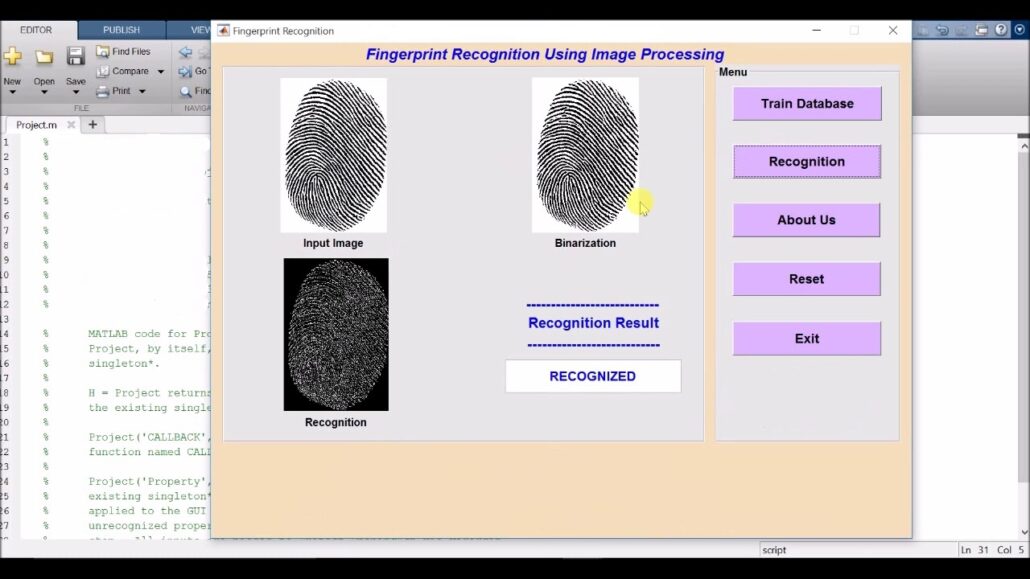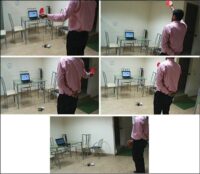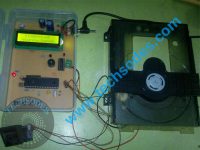Description
Fingerprint Recognition Using Image Processing in MATLAB
Fingerprint recognition is one of the most reliable and widely used biometric authentication techniques in today’s world. It relies on the unique patterns found on human fingers to authenticate and identify individuals. These patterns are determined by ridges and valleys in the fingerprint, which form distinct characteristics. In recent years, image processing techniques have been employed to improve fingerprint recognition systems, making them more accurate and efficient. MATLAB, with its powerful image processing toolbox, has become a popular tool for implementing fingerprint recognition systems.
Overview of Fingerprint Recognition
The process of fingerprint recognition involves several steps, which can be broadly categorized into two phases:
- 1. Fingerprint Enrollment
- 2. Fingerprint Authentication
- Enrollment involves capturing a fingerprint image, processing it to extract features, and storing the extracted features in a database.
- Authentication compares a newly captured fingerprint against the stored templates to identify or verify the user.
Key Components of Fingerprint Recognition Using Image Processing
The core steps involved in fingerprint recognition are:
- Fingerprint Acquisition
- Preprocessing
- Feature Extraction
- Matching
1. Fingerprint Acquisition
The first step in fingerprint recognition is acquiring the fingerprint image. This can be done using various fingerprint sensors or by scanning a printed fingerprint. The acquired image is usually in grayscale and contains noise, distortions, and variations in brightness, which need to be processed for accurate recognition.
In MATLAB, fingerprint images can be read using the imread() function, which loads the image into the workspace for further processing:
matlab code > fingerprintImage = imread(‘fingerprint_sample.jpg’);
2. Preprocessing
The acquired fingerprint image often contains noise or irregularities that must be corrected before further analysis. Preprocessing typically involves the following steps:
a. Image Enhancement
Enhancement is applied to improve the contrast between ridges and valleys. Techniques like histogram equalization or contrast adjustment can be used to make the ridges more distinguishable. In MATLAB, histogram equalization can be done using:
matlab code > enhancedImage = histeq(fingerprintImage);
b. Noise Reduction
Fingerprint images may also contain unwanted noise that can hinder feature extraction. Various filters like Gaussian filters or median filters can be used to reduce noise in the image:
matlab code > filteredImage = medfilt2(enhancedImage);
c. Image Segmentation
Segmentation isolates the region of interest (i.e., the actual fingerprint area) from the background. This step is crucial to ensure that irrelevant parts of the image are ignored. In MATLAB, segmentation can be performed using simple thresholding:
matlab code > thresholdedImage = imbinarize(filteredImage, ‘adaptive’);
d. Normalization
Normalization ensures that variations in brightness and contrast are removed so that all fingerprint images have a uniform appearance. This helps in accurately extracting features in the later stages.
3. Feature Extraction
Feature extraction is the most critical phase of fingerprint recognition. The uniqueness of a fingerprint is characterized by ridge bifurcations (where ridges split into two) and minutiae points (specific points on the ridge that have unique features).
The key steps involved in feature extraction are:
a. Ridge Thinning
Thinning is performed to reduce the width of ridges to a single pixel, which makes it easier to identify minutiae points. MATLAB provides various morphological operations for thinning:
matlab code > thinnedImage = bwmorph(thresholdedImage, ‘thin’, Inf);
b. Minutiae Detection
Minutiae are small unique features on the ridges, such as ridge endings, bifurcations, and ridge crossings. These minutiae points are extracted from the thinned image using algorithms that analyze ridge structures. In MATLAB, this can be done by analyzing the local neighborhoods of pixels in the binary image to detect ridge endings and bifurcations.
Minutiae extraction involves identifying the points in the image where ridges end or bifurcate. A commonly used approach is the crossing number algorithm, which examines the transitions between black and white pixels in the local 3×3 pixel neighborhood.
matlab code >
% Example of crossing number minutiae detection code:
% Detect minutiae points in the thinned image
4. Matching
After extracting minutiae from a fingerprint, the next step is to compare these features with the ones stored in the database. Matching is done by comparing the geometric properties of the minutiae points, such as their relative positions and orientations.
Fingerprint matching algorithms use the spatial distribution of minutiae points to compute a similarity score. If the similarity score exceeds a predefined threshold, the fingerprints are considered to match.
In MATLAB, various matching techniques such as Euclidean distance, Hamming distance, or template matching can be employed for fingerprint matching.
matlab code >
% Sample matching process using extracted minutiae points
Challenges in Fingerprint Recognition
Despite being one of the most reliable biometric systems, fingerprint recognition faces several challenges:
- Noise and Distortion: Fingerprint images often contain noise, smudges, or distortions due to varying pressure during acquisition.
- Low-Quality Images: Some images might be of low quality, which makes it difficult to extract reliable features.
- Partial Fingerprints: Incomplete fingerprint images can cause matching errors.
However, advanced image processing techniques and improvements in sensor technology are continually being developed to overcome these challenges.











Reviews
There are no reviews yet.